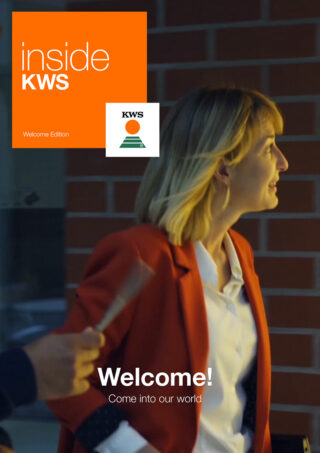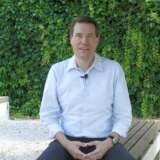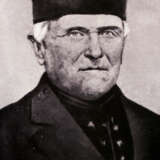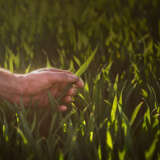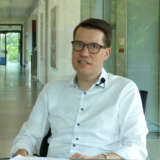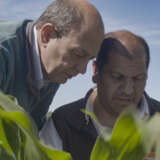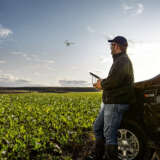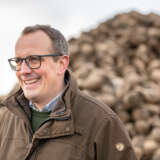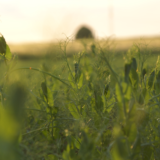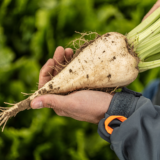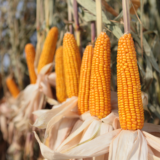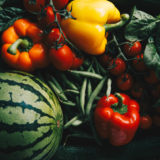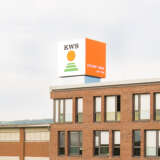Foresight
Decisions for the future
Thinking today about the products that will be in demand in ten years' time: Alexandra Molitor, Head of Strategic Planning, gives examples of this far-sightedness that is deeply rooted in our KWS culture. Our motto "Make yourself grow" shows that foresight also includes the satisfaction of our colleagues.

Research and development with modern means: We have recently invested more than 250 million euros into the agriculture of the future.
Foresight has a long history at KWS - in the truest sense of the word. Looking back a hundred years shows that: Sugarbeet was KWS' only crop until the 1920s. Following the economic losses caused by World War I, the company started to put the seed business on a broader base. KWS first added the breeding of fodder beet to its activities, quickly followed by cereals and potatoes, and in the 1950s corn, oil and protein plants. The foresight paid off, with all business areas developing as expected.
A similar chapter began at KWS in 2018: "As part of our strategic planning, we came to the conclusion that, against the backdrop of the limited growth potential of sugarbeet and the strong competitive environment for corn, we should open up a further high-margin business area for KWS by entering the vegetable seed market," says Alexandra Molitor, who heads our Strategic Planning. "We want to actively strengthen the 'seed for plant-based food' segment in the future as well." Even before we entered the vegetable business, food including or based on varieties from KWS ended up on our plates – for example in the form of flour, oils and sugar.
Potential of vegetables aligns with growth targets
So to further expand the company’s portfolio, KWS founded a new business unit: the BU Vegetables. "We are starting from scratch, with breeding programs for our own varieties, the establishment of breeding stations and supported by acquisitions," says Alexandra Molitor. It will take time to build this new business. "But KWS has the foresight to start today in order to have built up a strong business segment in ten years." After all, there is a lot of potential in vegetables - and globally. "That aligns with our growth targets."
The plan already looks promising after the first acquisitions: In 2019, the market leader Pop Vriend Seeds from the Netherlands added spinach seeds to our product portfolio. "And the topic of vegetables at KWS has continued to gain momentum," for example, through the acquisition of Geneplanta (tomatoes) in 2021 and the organic development of further vegetable varieties worldwide, explains Alexandra Molitor.

Part of the product portfolio since 2019: Spinach seeds.
With a view to its global business and in addition to organic growth, KWS also relies on acquisitions and cooperation in other areas: "We ask ourselves: Where do we want to be active? Where can we invest and enter into partnerships?" And this way KWS is able to quickly and successfully enter new markets. The result is joint ventures such as in China (corn) and entry into new markets such as Brazil (corn).
Prepared for expected growth with GLOBE
The continued expected global growth in all business units also requires a significant change in administration and support services at all levels, explains Alexandra Molitor: "In ten years' time, we will be even bigger and operate in even more countries. Our business will also grow significantly in Asia and South America. We needed an organizational structure that is better suited for our international operations." GLOBE (short for Global Business Excellence) bundles all of KWS' administrative functions and services, provides administrative services and forms the strategic administrative framework for KWS and its subsidiaries around the world. "The switch to GLOBE represented a major change for all of us. But it means we are prepared for future changes at an early stage."
Research and development with foresight
Research and development can also be compared to a long-distance run that requires foresight. This area has held a central role at KWS since the company was founded: "16 to 18 percent of our Group net sales currently go into research and development every year." Breeding new plant varieties is a ten- to fifteen-year process. "Farmers have to adapt to new regulatory requirements, and we are seeing firsthand that climate change is impacting arable farming." So, breeders need to know now what will be in demand in the future.
As a result, plant breeding also succeeds in achieving highly successful moves on the market: KWS has become the market leader in hybrid rye, for example, which is particularly high-yielding and resistant as a result of breeding. This success radiates to other areas: "We are pursuing similar ambitions for wheat and barley, and the same applies to potatoes, which is also a task that spans decades," Alexandra Molitor highlights. In view of global trends toward healthy meat-free diets, crops that can serve as alternative sources of protein are also coming more and more into focus. One example of this is peas. That, along with all KWS' other crops, demonstrates our sustainable thinking: "Part of our foresight is that we pursue the triad of economic, ecological and social sustainability.”

For us, dealing with colleagues is also part of foresight.
Colleagues that feel at ease
All these successes would not be feasible without the people at KWS. "Part of being far-sighted is ensuring that colleagues at KWS feel respected and part of the company," says Alexandra Molitor. Continuous learning is a key building block for this, to ensure that colleagues are prepared for the challenges of the future. "We teach our colleagues today what they will need the day after tomorrow." Even more: within the company, everyone can flourish in his or her job and also grow into new roles. "I myself have passed through various positions at KWS," says Alexandra Molitor. She came from Technology Management via intermediate steps to Strategic Planning. KWS has a firmly established slogan for this development opportunity: "Make yourself grow". |
© KWS SAAT SE & Co. KGaA 2025
